#tercesverse
Text
Tragic villains beyond redemption
To me, one of the most interesting parallels between ASOUE and the Secret Series is how the main antagonist is written.
Both Count Olaf and Ms. Mauvais are introduced as plain, absolute evil who will stop at nothing to get what they want. They are devoid of compassion, self-centered, manipulative, controlling, and always careful to set up a glamorous, awe-inspiring image of themselves. Plus, they're super creepy toward children and have ridiculously over-complicated schemes.
But the way they freak out when they're upset hints early on that their mental health might not be the best. And then, we suddenly learn about their past and realize that they, too, are human.
They were children taken by a cult that taught them their needs didn't matter, and their only purpose in life was to serve said cult. Most likely, they have suffered from trauma: Olaf's parents were murdered by the people he grew up with, including the love of his life. And Ms. Mauvais lost her family at an early age, leaving her with Itamar as her only human connection. He made her grow dependent on him and put her through constant emotional abuse.
At some point, they must have fallen for the convenient delusion that one accomplishment will magically relieve them from their pain. For Ms. Mauvais, it's immortality and power. For Olaf, it's vengeance on the Baudelaires. They sacrifice anything and everything to achieve this, to the point where they lose their grip on reality. And when they finally realize they'll never succeed, they choose death because they can't possibly live with themselves.
What makes villains like these so powerful is there's a tragedy to them without redemption or forgiveness. They chose to commit horrible crimes because it was their easy option. They experienced misery, they inflicted misery, and they died in misery. Props to writers who trust readers with a straight descent into hell.
#asoue#a series of unfortunate events#series of unfortunate events#atwq#all the wrong questions#snicketverse#lemony snicket#pseudonymous bosch#secret series#the secret series#the bad books#tercesverse#count olaf#ms mauvais#villain#villains#the midnight sun#vfd
177 notes
·
View notes
Text
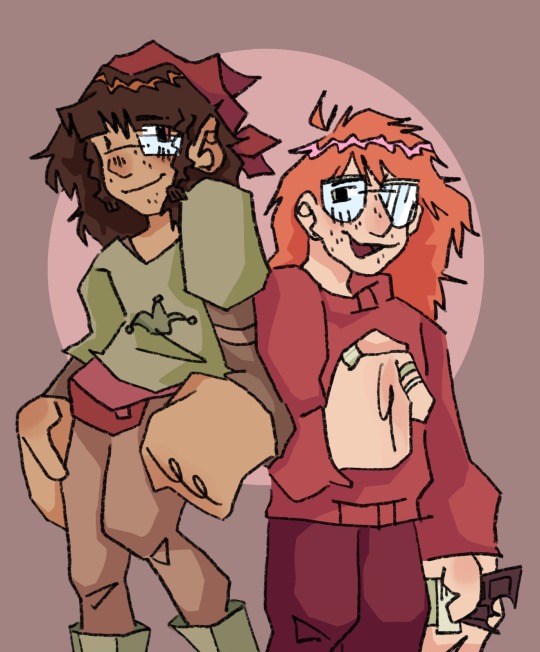
sorry guys i cant go out tonight there are middle grade book series characters in my head
#the secret series#tss#tnotbis#max-ernest the secret series#cass the secret series#tercesverse#im rereading this series and. uh oh theyre in my brain again#love these guys
14 notes
·
View notes
Text
whenever i feel down i just think about max-ernest forcing baby clay to watch citizen kane
#i can’t believe film snob max-ernest is canon he’s so fucking funny#the secret series#the bad books#bad magic#max-ernest tercesverse#paul-clay tercesverse
15 notes
·
View notes
Text
When I was younger and reading the secret series I had the biggest crush on cass and didn’t realize it till much later. Same with Violet from asoue. Same with Kate from mysterious benedict society. They were my idols “and i definitely want to be them I don’t have a crush on them or anything noooooooooo.”
#cass tercesverse#violet baudelaire#kate wetherall#the secret series#tss#a series of unfortunate events#asoue#the mysterious benedict society#tmbs#i love them they’re great#amazing characters my applause to you authors
71 notes
·
View notes
Text
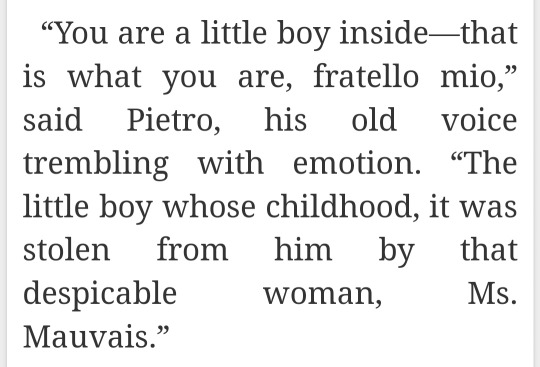
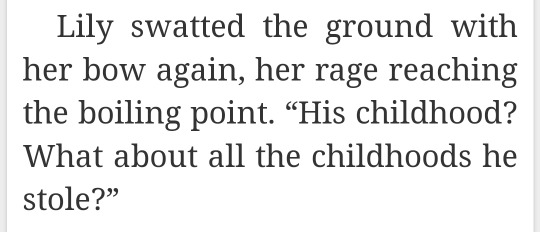
This is where Pietro breaks my heart.❤️😭
He denies Luciano's responsibility for his actions, putting all the blame on Ms. Mauvais. Not only is this harmful to Lily sitting next to him, who was put through hell by Ms. Mauvais and Luciano herself: But it's also a rabbit hole of making excuses. If Luciano was only a victim of grooming and manipulation, the same could be said for Ms. Mauvais, in which case all the blame should be shifted to Itamar, and so forth. Pietro fails to realize that his brother has been caught in a cycle of abuse that made him both a victim and a perpetrator.
As the leader of the Terces Society, Pietro should know better. But his human flaws get the better of him here. It's character moments like this that make me love Pseudonymous Bosch so much.
#pseudonymous bosch#the secret series#ms mauvais#the bad books#dr l#luciano bergamo#pietro bergamo#tercesverse#terces society#the terces society#the midnight sun#midnight sun
28 notes
·
View notes
Text
Abuse in a nutshell
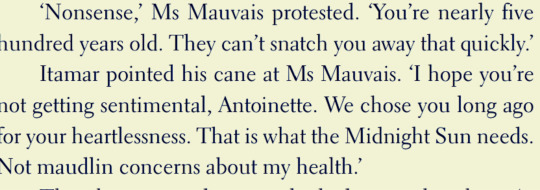
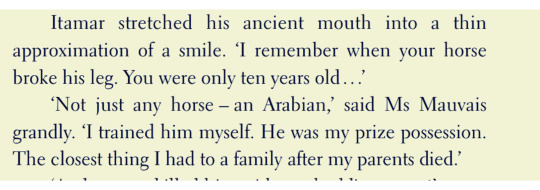
This is some brilliant writing. In this short dialog, we’re given a ton of information to unpack:
Ms. Mauvais was taken by the Midnight Sun as a child.
By that time, she was an orphan without any human connection.
Being ‘heartless,’ meaning emotionally numb, was probably a sign of PTSD/dissociation.
Itamar made her grow emotionally dependent on him, as she had no one else to care for her.
Itamar has been invalidating her emotions, shaming her for having any.
Itamar has been indoctrinating her into thinking that only her ability to serve the Midnight Sun makes her valuable.
Even now, he’ll still control her behavior.
The Midnight Sun’s cycle of abuse is rooted far deeper than we’ve seen before.
This level of intentional, calculating psychological cruelty gives me chills.
#pseudonymous bosch#the secret series#secret series#the midnight sun#midnight sun#ms mauvais#antoinette mauvais#abuse#emotional abuse#cycle of abuse#writing#tercesverse
12 notes
·
View notes
Text
I've been wondering what a crossover between the Snicketverse and the Tercesverse could look like, and it always comes down to V.F.D. and the Midnight Sun fighting over children as resources. I don't know what's wrong with me.
10 notes
·
View notes
Text
How the Terces Society Failed Amber
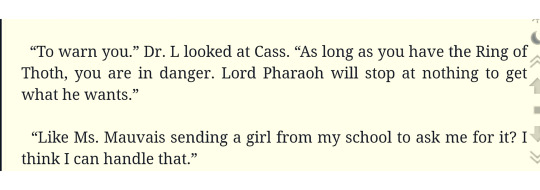
Sorry, this one is going to be a rant.
The Terces Society knows Ms. Mauvais has been grooming Amber, making her run errands in exchange for favors. (Even without a murderous alchemist cult involved, they should have seen the warning signs right away.)
They know that, first, the Midnight Sun is desperate to recruit children, second, Ms. Mauvais specifically targets young girls via the Skelton Sisters, and third, she coerced Amber into working for her via the Skelton Sisters. Who could have guessed the woman who's been kidnapping vulnerable children for decades and has been kidnapped as a vulnerable child herself, because she comes from an organization relying on kidnapping, would be planning to kidnap another vulnerable child? Certainly not the man who has suffered the same fate and has massive intel about this organization, or his brother who is the leader of a society that has been fighting them for centuries.
No one was left/able/willing to save Ms. Mauvais and Luciano from a life of abuse and corruption. But Amber could have been saved so easily, had the only people equipped with the necessary means and knowledge put two and two together and stepped in.
#pseudonymous bosch#the secret series#secret series#amber#amber tercesverse#tercesverse#dr l#luciano bergamo#pietro bergamo#ms mauvais#antoinette mauvais#the midnight sun#midnight sun#Cult#grooming#Kidnapping#terces society#the terces society
8 notes
·
View notes
Text
The Midnight Sun's Cycle of Abuse
One thing about Pseudonymous Bosch’s “The Secret Series” and “The Bad Books” blows my mind: the chilling and all too real way the Midnight Sun recruits generation after generation of loyal followers. While never directly explained, their tactics are shown all across the books, and once you put the pieces together, you see a nightmare far worse than the characters who are caught in it seem to comprehend.
So how exactly does their system of abuse work? What are the victims’ chances of escaping, and why does the Midnight Sun need to rely on an abuse cycle in the first place?
The Need for Followers
‘All of you here – all of you brave souls – you are all testimony to our success. Every year our elixirs grow stronger, and our lives grow longer. And yet—’ Ms Mauvais’ tone turned sombre. ‘And yet – we must face it – the ultimate triumph has eluded us. We call ourselves the Masters of the Midnight Sun – but still we chase the sun!’
(The Name of This Book Is Secret)
Promising longevity, power, and possibly immortality, the Midnight Sun probably never had challenges attracting new members. The problem they must have faced was binding their members to the organization for life. Under the glamorous facade, Midnight Sun members live on the edge of existence. Once they've reached a certain age, it's a constant struggle to make it yet another year and another, never knowing how much longer the elixirs will keep them alive. The servants just seem to slave away without benefitting from the luxury. The Masters seem to enjoy a pretty relaxed life unless the leader sends them on a mission. As for the leader, they are apparently responsible for everything: Supplying everyone with elixirs, bringing in money, bringing in new recruits, and chasing the secret of immortality. They literally carry the weight of the entire society on their shoulders, keeping everyone alive.
So how exactly do you convince people to dedicate their lives to your cause, all in the hope of uncovering a secret of which existence they can't even be certain? You make your organization a cult. You create a group identity of brave adventurers who push the boundaries of humanity. And you focus on recruits you can easily mold into your faithful followers: vulnerable children.
Attracting Children
‘Are you...a queen?’ Amber asked, trembling.
‘Ha! No, not...at the moment.’ Ms Mauvais made a chilly, tinkling sound that might have been a laugh. ‘But you are very shrewd – something tells me you’ll go far.’
She stepped forward and stroked Amber’s bowed head as if she were rewarding a little lap-dog.
(If You’re Reading This, It’s Too Late)
We see the Midnight Sun directly targeting children who have a certain quality they want and/or are in a vulnerable position.
Ms. Mauvais had been orphaned by the time she was ten years old and left with her horse as her only emotional connection. Itamar perceived her as “heartless,” by which he, given the context, probably meant emotionally numb. This implies she was traumatized and dissociating, her brain protecting itself from the pain. She must have felt utterly lost and helpless in a world that could collapse at anytime.
Young Luciano was in a precarious situation as well. Pietro and he had to leave behind their home and their family. Alone in a foreign country, they were forced to fend for themselves while constantly fearing for their parents’ safety. They were at the mercy of a callous ringmaster who viewed them as mere assets for profit.
While Amber does have a very sheltered life, by comparison, she is tormented by her insecurities. She’s always anxious about being popular and pretty. When she’s not surrounded by people who admire her, she feels lost and insignificant. We see her struggling with her social status and the physical changes of growing up. By the time of “You Have to Stop This,” she’s most likely terrified of going to high school and having to prove herself from scratch.
This is where Itamar/Ms. Mauvais step in. They appear as stunning, charismatic saviors who promise to fulfill these kids’ needs: to be accepted, safe, cared for, and loved. They provide them with a community and a role model, offering them a sense of control over their lives and a new identity. They make them feel special and worthy of being chosen for a superhuman life.
Once they’ve wrapped the children around their fingers, they isolate them from their surroundings and keep them around at all times. Now they got them right where they want them: depending on them alone.
Systematic Abuse
Itamar pointed his cane at Ms Mauvais. ‘I hope you’re not getting sentimental, Antoinette. We chose you long ago for your heartlessness. That is what the Midnight Sun needs. Not maudlin concerns about my health.’
(This Book Isn’t Good For You)
The goal of the Midnight Sun is to break these kids, molding them into efficient, unfeeling machines who will stop at nothing to advance the organization’s goals. The “mentors” use their power over their “students” to control their thoughts, feelings, and behavior. They punish them emotionally and physically abusing them when they don’t fully meet their expectations.
What we see is mostly a combination of invalidation and shaming. Itamar dismisses Ms. Mauvais’s fear of losing him, making her feel guilty and worthless for having natural human emotions. Later, Ms. Mauvais does the same to Amber when she’s panicking because of the fire. She also publicly humiliates her for failing to capture the dragon and infantilizes her by calling her “girl” even when she’s an adult.
Both Itamar and Ms. Mauvais make a point of never fully appreciating their wards’ accomplishments. No matter how hard they try, they’re never good enough. Itamar’s last words to Ms. Mauvais are literally him telling her to do better recruiting new members.
The victims are made to feel small and worthless, losing any self-esteem and sense of agency. They’re no longer valued as people. Instead, their only worth and the chance of achieving anything come from behaving exactly like the abusers want them to. The abusers put themselves on a pedestal, always pretending to know best. Ms. Mauvais still displays that attitude toward Luciano by snapping at him whenever he questions her decisions.
The abusers make themselves the center of their victims’ lives, whose only goal is to please them and to win their affection. Ultimately, this results in destroying the victims’ sense of personhood. Instead, they absorb their role as a Midnight Sun agent as the only thing that defines them and gives them a purpose.
Internalizing Abuse
The French were cruelly snobbish, very strict about their manners and customs, none more so than the grande madame Antoinette Mauvais; and there had been many times over the last ten years when Amber had regretted making herself Antoinette’s ward. She knew she could never fully please the ancient French woman.
(Bad Luck)
As they grow up, the victims deny and justify the abuse as a coping mechanism. They buy into the lies their abusers feed them to protect themselves from the horrible truth: That the one person they’ve latched onto is a violent monster who has never viewed them as anything but a tool to further their agenda, and there is nothing they can do about it.
We see them glorifying their abusers, blaming themselves when they are being hit or humiliated. This thinking is hinted at when Ms. Mauvais calls Mr. Cabbage Face a “miserable and ungrateful creature” for killing Lord Pharao. She’s probably unable to comprehend why he would rise against his creator, who tortured him. She seems to have internalized the idea that your master is your savior, your master knows best, and if they mistreat you, you deserve it. Instead of complaining or rebelling, you should embrace the role they have chosen for you.
There is even some logic to this: The Midnight Sun “saved” the children from a short life span and dire circumstances, so they should be grateful. They are offered money, power, beauty, long life, and perhaps even immortality. Once they’ve tasted this, they quickly become corrupted, wanting more. It’s so seductive, for instance, to forget you’re just one step away from being crushed when you get to control an entire cruise ship and bring a millionaire to his knees with your charms. Or when you run a school full of brain-washed children or command servants with a snap of your fingers.
They start viewing themselves as powerful leaders who stand above common mortals. They convince themselves everything done to them was necessary to prepare them for the exceptional task of attaining immortality. Of course, they repeat this pattern, for this is how you set up a kid for greatness. They create an illusion of control: If they are only determined and ruthless enough, nothing will ever be able to harm them again.
But none of this will ever heal the wounds inflicted on them or even those that made them prone to their abusers’ influence in the first place. And at some point, they either need to admit this or sink deeper into their delusions.
Awareness
‘Itamar made you what you are, didn’t he? Just as you made me,’ Dr L reflected. ‘I wonder what I will feel when you die...’
(This Book Isn’t Good For You)
At Itamar’s deathbed, Luciano seems to realize how wrong he has been. We have seen him struggling internally before when facing his brother. He witnesses the Midnight Sun’s failure and Ms. Mauvais’ mourning, both of which shouldn’t be possible, according to his indoctrination. He probably understands that their chances of actually achieving immortality are minimal. Ms. Mauvais never acted the way she did because she knew best but because she never knew better. They are trapped in machinery set up by people who never cared about any individual.
Though she never admits it to herself, Ms. Mauvais seems to know this too. This becomes clear when Cass confronts her about being unable to triumph because she will never be loved. She’s given her whole life to Midnight Sun, yet she’ll still be lost. Eternal life would be eternal suffering to her.
Amber doesn’t seem to realize she’s being abused at all. She’s unhappy with her situation, but she is convinced she needs to side with a strong team, so the Midnight Sun is the best option. She can’t imagine being her own person.
Escape?
'After you two saw him, my brother, he stopped taking those evil elixirs,’ explained Pietro. ‘I think he wanted to prove to me he was true - he was done with the Midnight Sun. He came for a last visit and looked very old, very old. He could hardly speak. And then this morning - he is no more.’
(You Have to Stop This)
So how can you break the cycle? It gets harder the longer you stay in, especially after you’ve reached the end of your natural lifespan. At this point, the people and the world you knew are gone forever. Besides, you’ve given your entire identity and humanity away. There truly is no place for you anywhere but in the Midnight Sun.
Luciano manages to turn his back on them because of two things: First, he has the strength of character to face the painful truth and act upon it. And second, he still has his brother Pietro, who never gave up on him. Pietro’s willingness to forgive him is likely what Luciano needs to make his final decision. He chooses to die, being reunited with the one person who has always loved him, over living for an eternity of emptiness and self-deception.
As for Ms. Mauvais, her only way of getting out is literally death. When Clay offers to take her along as a prisoner to save her from the dragons, he unknowingly builds her an easy exit. There is no way she could live with only herself, being stripped of her power and identity as the leader of the Midnight Sun. Finally, she can choose to leave it all behind without having to face any of it. Perhaps she even believes she’s dying a hero’s death, proving how great a leader she is by making the ultimate sacrifice.
It’s a real pity we never see the closure of Amber’s arc because she has the best chance to make it out alive, heal, grow, and lead a normal life again. She is still very young, still has a family, and, as far as we know, there is no blood on her hands yet.
Conclusion
The real villain of the series is the Midnight Sun as a system. It’s far more powerful and terrifying than any of the individual members. It weaponizes victims and makes them continue the cycle, causing suffering and destruction to everyone around them and themselves.
#pseudonymous bosch#the secret series#secret series#the bad books#tercesverse#cassandra tercesverse#the midnight sun#midnight sun#ms mauvais#antoinette mauvais#dr l#luciano bergamo#pietro bergamo#amber#the name of this book is secret#if you're reading this it's too late#this book is not good for you#you have to stop this#bad luck#bad news#clay tercesverse#paul-clay#abuse#emotional abuse#physical abuse#child abuse#internalized abuse#cycle of violence#cycle of abuse#villains
8 notes
·
View notes
Note
who's your favorite of the terces trio? :)
Hm, that's a good question. I think it's Max-Ernest because his character arc is so touching and relatable to me in some aspects.
He starts as a lonely, deeply insecure kid who has never known a stable, healthy human connection in his life. He had to learn to constantly walk on eggshells with his parents, always fearing to pit them up against one another. He was led to believe something was wrong with him instead with them. And he grows up to be a confident, capable adult, an entertainer, and a loving parent for his brother. We see him building trust and friendship, connecting with his emotions, embracing his quirks, and rising to the challenge of raising Clay.
4 notes
·
View notes
Text
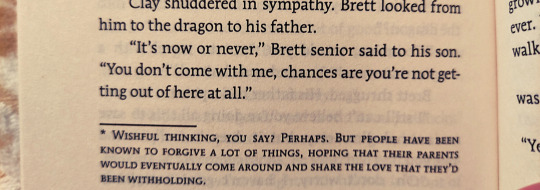
Congratulations, Brett senior! You've managed to become the worst parent in this entire universe. And this includes the parents of Max-Ernest and Clay, so that means something. But emotionally torturing your son into a binge eating disorder and leaving him to die takes the cake.
4 notes
·
View notes
Text
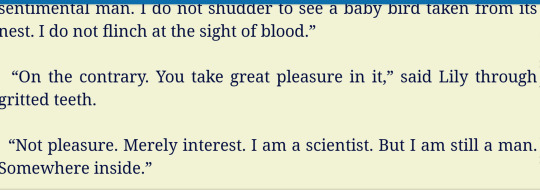
Luciano seems to have built his identity around being a "scientist" as a coping mechanism. That way, he has been able to rationalize everything he has done. It’s easier to tell yourself it’s okay to kidnap, torture and murder children when it’s all for the sake of science.
3 notes
·
View notes
Text

happy pride month to max-ernest and also max-ernest
38 notes
·
View notes
Note
*holds up microphone* What are your opinions on aromantic Cass because I just. Look to me she just is
not a possibility i had really considered beforehand (was mostly in lesbian cass camp) but oh i love this so much!!!
#i love just going ham with queer terces headcanons. give them all the genders and sexualities and neopronouns#aromantic cass is so beautiful to me#the secret series#kiran.txt#cassandra tercesverse#asked and answered
22 notes
·
View notes
Text
something something max-ernest saying that he will probably have two names for the rest of his life because he associates his double names with his parents vs clay dropping his second name as soon as he can because he associates his double names with his brother
#max-ernest finding out that pc just goes by clay now: you can just do that????#these two make me so miserable jesus christ#max-ernest tercesverse#paul-clay tercesverse#the secret series#the bad books#kiran.txt
16 notes
·
View notes
Text
do you guys think max-ernest sits criss cross in chairs
5 notes
·
View notes